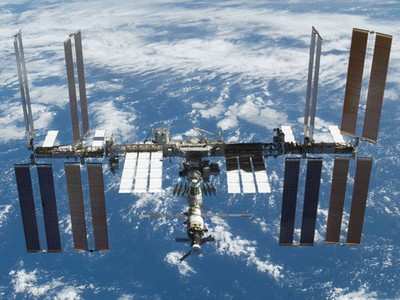Mon, Sep 27, 2010
Some Nations Already Committee To ISS Operations Through
2020
The International Space Station partner agencies met September
21st via videoconference to discuss continuation of space station
operations into the next decade and its use as a research
laboratory.

NASA Image
The Multilateral Coordination Board (MCB) meeting included
senior representatives from NASA, the Canadian Space Agency (CSA),
the European Space Agency (ESA), the Russian Federal Space Agency
(Roscosmos), and the Japanese Ministry of Education, Culture,
Sports, Science and Technology (MEXT). The MCB meets periodically
to ensure coordination of station operations and activities among
the partners.
The MCB was pleased to learn that the government of Japan has
approved continuing space station operations beyond 2016. Coupled
with the approval of the government of the Russian Federation for
continuation to 2020, this progress is indicative of the strength
of the station partnership and the successful use of station. ESA
and CSA are working with their respective governments to reach
consensus about the continuation of the station. NASA also is
continuing to work with the U.S. Congress to complete the necessary
procedures to extend station operations consistent with the
presidential budget request. The MCB also noted the benefits to
future exploration beyond low-Earth orbit through enhanced station
research, technology development and other opportunities.
Each partner agency reaffirmed its commitment to gaining the
maximum return from station with increasing the operational
efficiency. On-going research with potential societal impacts
includes:
NASA and the National Institutes of Health recently announced three
new biomedical experiments using the station's unique microgravity
facilities to improve human health on Earth. The experiments will
use the station to study how bones and the immune system weaken in
space as part of NIH's new BioMed-ISS program.
- CSA
will focus its life science research program on mitigating health
risks associated with spaceflight. More specifically, these health
experiments and activities will monitor crew health and deliver
health care on space missions, develop exercise, etc.
- ESA just started a fluid
physics experiment in the Microgravity Science Glovebox onboard the
station's Columbus module that is of high interest to material
scientists. The experiment uses advanced optical diagnostics to
investigate the transformation of particles to aggregates due to
density fluctuations in a mixture. The ESA experiment demonstrates
a new capability to reverse and fine-tune the aggregation process;
such control may yield a significant potential impact on
fabrication of micro-structured materials such as photonic
crystals.
- Roscosmos continues experimental
programs aimed at human's adaptation to future long-term
expeditions. Effects of the flight conditions on the cardiovascular
system, the respiratory system and bones are being carefully
investigated in dedicated medical experiments. Other research being
conducted includes plantation of wheat and vegetables followed by
genetic, microbiological and biochemical tests of plants.
- Japan's externally mounted
X-Ray camera monitors more than 1,000 X-ray sources in space,
including black holes and neutron stars. The instrument scans the
entire sky in X-ray wavelengths and downlinks data to be
distributed through the Internet to research groups around the
world. Since last October, it has issued more than 50 alerts for
the X-ray transient phenomena.
All of the partners also recognize the key role of the space
station in inspiring students around the world to learn about
science, technology, engineering and mathematics. More than 30
million students have participated in human spaceflight though
communications downlinks and interactive experiments with station
astronauts.
More News
He Attempted To Restart The Engine Three Times. On The Third Restart Attempt, He Noticed That Flames Were Coming Out From The Right Wing Near The Fuel Cap Analysis: The pilot repor>[...]
Make Sure You NEVER Miss A New Story From Aero-News Network Do you ever feel like you never see posts from a certain person or page on Facebook or Instagram? Here’s how you c>[...]
From 2009 (YouTube Edition): Leading Air Show Performers Give Their Best Advice for Newcomers On December 6th through December 9th, the Paris Las Vegas Hotel hosted over 1,500 air >[...]
Aero Linx: NASA ASRS ASRS captures confidential reports, analyzes the resulting aviation safety data, and disseminates vital information to the aviation community. The ASRS is an i>[...]
“For our inaugural Pylon Racing Seminar in Roswell, we were thrilled to certify 60 pilots across our six closed-course pylon race classes. Not only did this year’s PRS >[...]
 NTSB Final Report: Rutan Long-EZ
NTSB Final Report: Rutan Long-EZ ANN FAQ: Turn On Post Notifications
ANN FAQ: Turn On Post Notifications Classic Aero-TV: ICAS Perspectives - Advice for New Air Show Performers
Classic Aero-TV: ICAS Perspectives - Advice for New Air Show Performers ANN's Daily Aero-Linx (06.28.25)
ANN's Daily Aero-Linx (06.28.25) Aero-News: Quote of the Day (06.28.25)
Aero-News: Quote of the Day (06.28.25)



